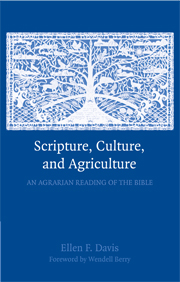Book contents
- Frontmatter
- Contents
- Foreword by Wendell Berry
- Acknowledgments
- Abbreviations
- Introduction
- 1 Rupture and Re-membering
- 2 Reading the Bible Through Agrarian Eyes
- 3 Seeing with God: Israel's Poem of Creation
- 4 Leaving Egypt Behind: Embracing the Wilderness Economy
- 5 A Wholesome Materiality: Reading Leviticus
- 6 Covenantal Economics: The Biblical Case for a Local Economy
- 7 Running on Poetry: The Agrarian Prophets
- 8 Wisdom or Sloth? The Character of Work
- 9 The Faithful City
- Postscript
- Notes
- Scripture Index
- Index
5 - A Wholesome Materiality: Reading Leviticus
Published online by Cambridge University Press: 05 June 2012
- Frontmatter
- Contents
- Foreword by Wendell Berry
- Acknowledgments
- Abbreviations
- Introduction
- 1 Rupture and Re-membering
- 2 Reading the Bible Through Agrarian Eyes
- 3 Seeing with God: Israel's Poem of Creation
- 4 Leaving Egypt Behind: Embracing the Wilderness Economy
- 5 A Wholesome Materiality: Reading Leviticus
- 6 Covenantal Economics: The Biblical Case for a Local Economy
- 7 Running on Poetry: The Agrarian Prophets
- 8 Wisdom or Sloth? The Character of Work
- 9 The Faithful City
- Postscript
- Notes
- Scripture Index
- Index
Summary
For you love all things that exist,
and detest none of the things that you have made,
for you would not have made anything if you had hated it.
(Wisdom of Solomon 11:24 NRSV)In law is rest
if you love the law,
if you enter, singing, into it
as water in its descent.
(Wendell Berry)The ultimate goal of farming is not the growing of crops, but the cultivation and perfection of human beings.
(Masanobu Fukukoa)THE LAND COMMUNITY
A generation ago, economist E. F. Schumacher described the mind-set and economic practice dominant in our time as “the forward stampede”; those committed to it are bent on ignoring the limits inherent in human existence, their watchwords being “more, further, quicker, richer.” In their view, the crises we face are to be handled, not by reconsidering the course of our technological “progress,” but rather by completing it. Schumacher contrasted the people of the forward stampede with those he called “home-comers.” The latter recognize that the beauty and dignity of human life depends upon living within certain limits that are necessary and therefore becoming. As Schumacher famously observed: “Man is small, and therefore small is beautiful. To go for giantism is to go for self-destruction.” In his view, the Christian gospel provides the basic text for the home-comer mentality: “How blessed are those who know that they are poor.…” Accordingly, insightful and prescient though he was, even Schumacher might be surprised at the ingenuity with which, a few decades later, the gospel has been appropriated by advocates of the forward stampede.
- Type
- Chapter
- Information
- Scripture, Culture, and AgricultureAn Agrarian Reading of the Bible, pp. 80 - 100Publisher: Cambridge University PressPrint publication year: 2008



